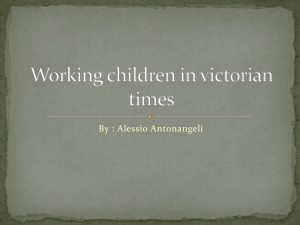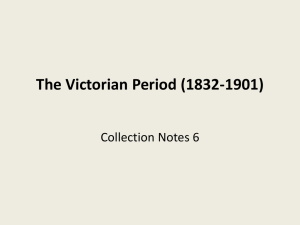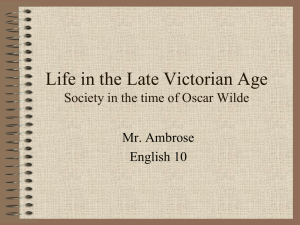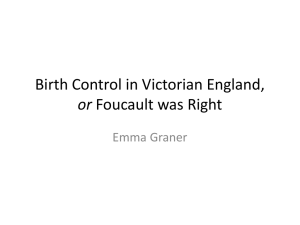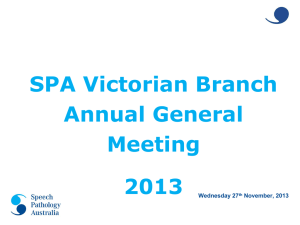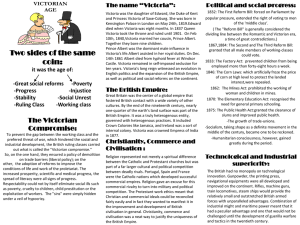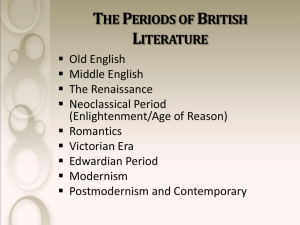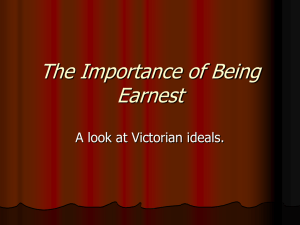File - Ashley Hendricks Portfolio
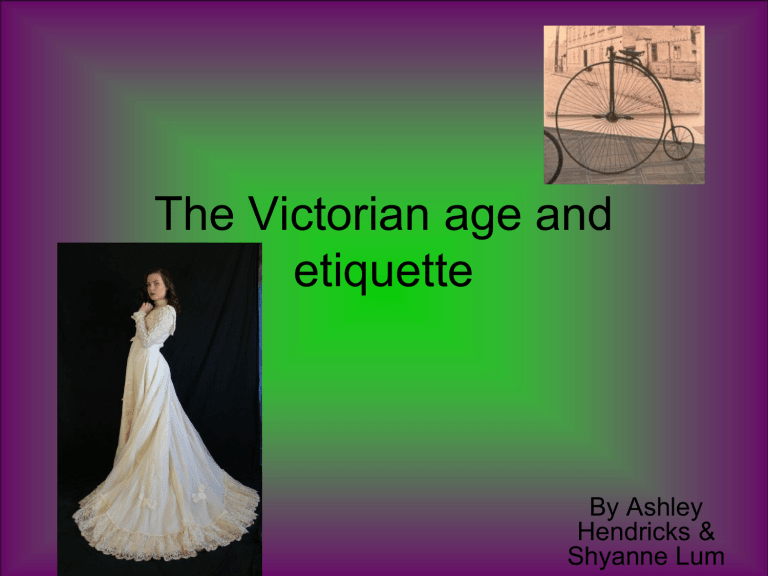
The Victorian age and etiquette
By Ashley
Hendricks &
Shyanne Lum
Victorian Dress Victorian dress
• Victorian Dress
– Victorian fashion comprises the various fashions and trends in British culture that emerged and grew in province throughout the
Victorian era and the reign of Victoria, a period which would last from June 1837 to
January 1901.
Victorian Dress
• Women's Fashion
– In the 1840s and1850s, women's gowns developed narrow and sloping shoulders, low and pointed waists, and bell-shaped skirts.
Corsets, a knee-length chemise, and layers of flounced petticoats were worn under the gowns.
Queen Victoria’s family
• Queen Victoria’s family
– Queen Victoria was known as the grandmother of Europe. She and her husband, Albert, Prince Consort, had nine children, who presented her with thirty-seven grandchildren. Eight of whom sat on the thrones of Europe, those of
Great Britain, Prussia, Greece, Romania,
Russia, Norway, Sweden and Spain. The
Queen herself was a carrier of hemophilia, her son Prince Leopold was born with the disease and through three of Victoria's daughters it was to pass into many of the Royal houses of Europe and became known as the Royal disease.
Queen Victoria’s family
• KAISER WILLIAM II 1859-1941
• Charlotte, Duchess of Saxe-
Meiningen 1860-1919
• Henry, Prince of Prussia 1862-1929
• Sigismund, Prince of Prussia 1864-
66
• Victoria, Princess of Schaumburg-
Lippe 1866-1929
• Waldemar, Prince of Prussia 1868-79
• SOPHIA, QUEEN OF GREECE
1870-1932
• Margaret, Landgravine of Hesse
1868-1940
Victorian era(1837-1901)
• Mid-late Victorian dresses:
– In 1864 the new Princess grown changed the line of fashionable dress. The Princess grown was cut in one piece and consisted of a number of joined panels fitted and gored from shoulder to hem that gave the figure shape through seaming.
Victorian era(1837-1901)
• The late Victorian silhouette
– By 1878, women of the late Victorian era have a very different look about them compared to earlier Victorian women.
– The soft polonaise style bustle styles were replaced by princess sheath garments without a waist seam with bodice and skirt cut in one.
Victorian era
• The average life expectancy in the U.S. was 47 years.
• Only 14% of the homes in the U.S. had bathtubs.
• Only 8% of the homes had a telephone.
• A three-minute call from Denver to New York City cost
$11.00.
• There were only 8,000 cars in the U.S., and only 144 miles of paved roads. The maximum speed limit in most cities were 10mph.
• Alabama, Mississippi, Lowa, and Tennessee, were each more heavily populated than California. With a mere 1.4 million residents, California was only the 21 st most populous state in the union.
Victorian era
• Horseback riding in the 19 th century could be just as appealing to young ladies as in our present day- with a bit more a challenge.
The Victorian Era- etiquette of
Conversation
• What to avoid in social conversation
– Do not manifest impatience
– Do not engage in argument
– Do not interrupt another when speaking
– Do not find fault, although you may gently criticize
– Do not talk of your private, personal and family matters
The Victorian Era- etiquette of
Conversation
• Refinement as indicated by conversation
– Do not lose temper
– Do not allude to unfortunate peculiarities of any one present
– Do not always commence a conversation by allusion to weather
– Do not, when narrating an incident, continually say “you see”, You know”, ect.
– Do not introduce professional; or other topics in which the company generally can not take an interest
Table manners
• Basic Table Manners
– 1. Sit up straight.
– 2. Don't speak with your mouth full of food.
– 3. Chew quietly, and try not to slurp.
– 4. Keep bites small.
– 5. Eat at a leisurely pace.
Table manners
• Basic Table Manners
– 6. Don't wave utensils in the air
– 7. Keep your elbows off the table.
– 8. Don't Reach.
– 9. Don't forget please and thank you.
– 10. Excuse yourself when leaving the table.
Victorian Rituals and Traditions
• Tea time rituals
– Picnics were very popular with the Victorians, because it supplied them the opportunity to escape from their formal dinning rituals.
Victorian Rituals and Traditions
• Victorian Mourning Rituals
– When people died during the reign of Queen Victoria the corpse usually stayed in the home until the burial. The body was surrounded by family and friends where viewing and touching the deceased were commonplace.
Even children were not spared from viewing the dead
Victorian Station
• Bicycling
– Arbiters of fashion prescribed a specific costume for cycling, for, as Mrs. M. Cooke wrote in 1896. “It is impossible to do good work or to practice comfortable unless you are properly dressed”. For women
Tricyclists, Godney’s recommended a straight, side pleate skirt of serge, worn over one underskirt and full trousers lined with flannel and made of material to match the dress. A warm jersey and jacket trimmed with fur, a “tricyclists” cap to match, completed the outfit.
Victorian Station
• Recipes
– Basic Muffins
• 1 cup self rising flour
• ½ cup sugar
• 1 egg
• ¼ cups Canola Oil
• ½ cup milk
• ¼ cup pecans
• ¼ cup Chocolate Chips
– Combine flour, sugar, pecans, and chocolate chips in mixing bowl, and stir together. Whisk egg milk, and oil together and add to dry ingredients. Mix together only until dry ingredients are moist. Pour in greased muffin tins, usually about 8. Bake at 400 degrees for 23-25 minutes, or until golden brown. Chocolate chips and pecans can be substituted for chopped cherries and almonds, walnuts and dried cranberries, ect.
– Serves: 4
Victorian Station
• Rules to dinning
– Married couples are never seated together.
– Ladies remove their gloves once they are seated; gentlemen however must remove their gloves prior to being seated.
– The senior lady, either by age or social standing, is always led in first by the host of the party. The hostess arrives last on the arm of the senior male.
– It is ridiculous to make a display of your napkin.
– Never ask for “meat instead of beef.
– Never turn up your cuffs in carving.
– Never take bread, even when it is within your reach, instead of calling upon the servant.
– Never cut your bread with a knife, it should be broken by hand.
– Always use you napkin before and after drinking.
Victorian Etiquette
• Basic Victorian Etiquette& Manners:
– Rising to one’s feet when being introduced, or when someone enters the room.
– Ladies do a little curtsey and men greet with a bow.
– Never turn your back on someone. When you have to remove yourself from the attention or presence of someone, to answer a door, look out the window ect, you always asked to be excused.
Victorian Etiquette
• How to be a lady in a Victorian etiquette:
– That simply means that a woman’s beauty must be natural, with fair and clear skin due to good health, rosy cheeks due to excitement and a zest for life, interesting eyes due to a sharp, educated mind
– Dress must be modest in feminine styles and colors are much preferred.
– There was a greater distinction in dress between men and women in Victorian times.
There was no room for ambiguity.
Top 10 creepy Aspects of Victorian
Life
• 10. Vignettes- The Victorian upper class had no televisions to entertain them, so they entertained themselves. One of the popular forms of entertainment was for friends and family to dress up in outrageous costumes and pose for each other.
Top 10 creepy Aspects of Victorian
Life
• 9. Poorhouses were government-run facilities where the poor, infirm, or mentally ill could live. They were usually filthy and full to the brim of societies unwanted people. Many of the people who lived in the poorhouses were required to work to contribute to the cost.
Top 10 creepy Aspects of
Victorian Life
• 8. Pea-Soupers
– London during the Victorian era was famed for its pea-soupers
— fogs so thick you could barely see through them. The pea-soupers were caused by a combination of fogs from the
River Thames and smoke from the coal fires that were an essential part of Victorian life.
Top 10 creepy Aspects of
Victorian Life
• 7. Food
– English food can be creepy at the best of times, but especially so in the Victorian era (disclaimer: England currently produces some of the finest food in the world).
The Victorians loved offal and ate virtually every part of an animal.
Top 10 creepy Aspects of
Victorian Life
• 6. Surgery
– One in four surgery patients died after surgery.
• 5. Goyhic novel
– How could the gothic novel (a genre of literature that combines elements of both horror and romance) not be included on a list like this? It was the Victorian period that gave us such great works of terror as Dracula, and the Strange Case of Dr Jekyll and Mr. Hyde.
Top 10 creepy Aspects of
Victorian Life
• 4. Jack the ripper
– In the late Victorian era, London was terrorized by the monster known as Jack the
Ripper. Using the pea-soupers as a cover, the
Ripper ultimately slaughtered five or more prostitutes working in the East End.
Top 10 creepy Aspects of
Victorian Life
• 3. Freak Shows
– A freak show is an exhibition of rarities, “freaks of nature” — such as unusually tall or short humans.
• 2. Memento mori
– It was too extensive to get a photographs of yourself, so they got photographs of the dead.
Top 10 creepy Aspects of
Victorian Life
• 1. Queen Victoria
– Queen Victoria has to have position number one on this list because the era is named for her.

